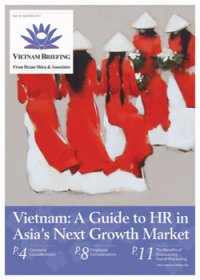Vietnam Mulls Additional US$1 Billion Bond Issuance
 HANOI – Vietnam’s Minister of Finance, Dinh Tien Dung, has announced that the country is considering issuing another US$1 billion in 10-year government bonds. The potential issue date has not yet been confirmed.
HANOI – Vietnam’s Minister of Finance, Dinh Tien Dung, has announced that the country is considering issuing another US$1 billion in 10-year government bonds. The potential issue date has not yet been confirmed.
Vietnam’s Ministry of Finance (MoF) previously issued US$1 billion in bonds in November 2014 at a fixed interest rate of 4.8 percent in order to restructure its high-interest foreign loans. A similar issue in 2010 saw bonds sell at a 6.755 percent interest rate.
Confidence in the bond market is steadily improving as Vietnam’s credit rating rises. In November 2014, Fitch raised its credit rating of the country to BB-, three levels under investment grade. The following month, Moody’s raised its rating of the Vietnamese banking system from a negative to a stable assessment, having raised its credit rating in July 2014 to B1, four levels under investment grade.
In the long-term, Vietnam is working to build its case for an upgrade of its classification as a frontier market to emerging-markets status, as defined by MSCI Inc. – an upgrade would spur investor confidence in the country. In particular, the country is considering relaxing its foreign equity limits. Upgrades in the MSCI index can have significant effects on a country’s economy, for example, after MSCI announced that Qatar and the United Arab Emirates were being upgraded to emerging-market status, the countries benchmark stock indexes grew by 38 percent over a 12 month period.
Investing in Vietnamese capital markets has its challenges; foreign ownership limits of 49 percent are still in place on Vietnamese companies. A plan drafted by the MoF to ease restrictions on foreign ownership to a 60 percent limit has been shelved for the time being, and any changes do not look likely until at least 2016. Such changes would then need approval from the Prime Minister.
However, in practice these restrictions do not seem to apply to assets of a company’s subsidiaries. Mondelez International raised eyebrows this year when it bought an 80 percent stake in a subsidiary of the listed company Kinh Do Corp. As the subsidiary was not a listed entity, such tight restrictions on foreign investment do not appear to have applied.
Additionally, investors must file relevant notarized documentation with the stock exchange from which they wish to operate in. Brokers may apply restrictions on the currency used to fund trading accounts, depending on the country of origin of the investor.
Vietnam’s public debt is estimated to be approximately 60.3 percent of GDP, according to a government report submitted to the National Assembly in its most recent session. This figure is forecast to rise to 64 percent in 2015, which is set to be an interesting year for Vietnamese bond markets as the country approaches the 65 percent debt ceiling set by the National Assembly. While debt is set to rise, Deutsche Bank has released a note projecting below five percent inflation and GDP growth of 6.2 percent in 2015.
Asia Briefing Ltd. is a subsidiary of Dezan Shira & Associates. Dezan Shira is a specialist foreign direct investment practice, providing corporate establishment, business advisory, tax advisory and compliance, accounting, payroll, due diligence and financial review services to multinationals investing in China, Hong Kong, India, Vietnam, Singapore and the rest of ASEAN. For further information, please email vietnam@dezshira.com or visit www.dezshira.com.
Stay up to date with the latest business and investment trends in Asia by subscribing to our complimentary update service featuring news, commentary and regulatory insight.
Related Reading
 Vietnam: A Guide to HR in Asia’s Next Growth Market
Vietnam: A Guide to HR in Asia’s Next Growth Market
In this issue of Vietnam Briefing, we attempt to clarify human resources (HR) and payroll processes in Vietnam. We first take you through the current trends affecting the HR landscape and then we delve into the process of hiring and paying your employees. We next look at what specific obligations an employer has to their employees. Additionally, we guide you through the often complex system of visas, work permits, and temporary residence cards. Finally, we highlight the benefits of outsourcing your payroll to a “pan-Asia” vendor.
 Tax, Accounting, and Audit in Vietnam 2014-2015
Tax, Accounting, and Audit in Vietnam 2014-2015
The first edition of Tax, Accounting, and Audit in Vietnam, published in 2014, offers a comprehensive overview of the major taxes foreign investors are likely to encounter when establishing or operating a business in Vietnam, as well as other tax-relevant obligations. This concise, detailed, yet pragmatic guide is ideal for CFOs, compliance officers and heads of accounting who need to be able to navigate the complex tax and accounting landscape in Vietnam in order to effectively manage and strategically plan their Vietnam operations.
 An Introduction to Doing Business in Vietnam 2014 (Second Edition)
An Introduction to Doing Business in Vietnam 2014 (Second Edition)
An Introduction to Doing Business in Vietnam 2014 (Second Edition) provides readers with an overview of the fundamentals of investing and conducting business in Vietnam. Compiled by Dezan Shira & Associates, a specialist foreign direct investment practice, this guide explains the basics of company establishment, annual compliance, taxation, human resources, payroll, and social insurance in the country.
- Previous Article Vietnam-Eurasian Customs Union Free Trade Agreement Negotiations Concluded
- Next Article Vietnam to Launch National Foreign Investment Information System









